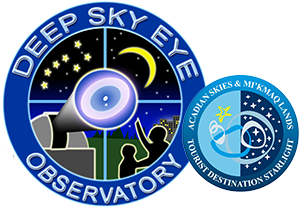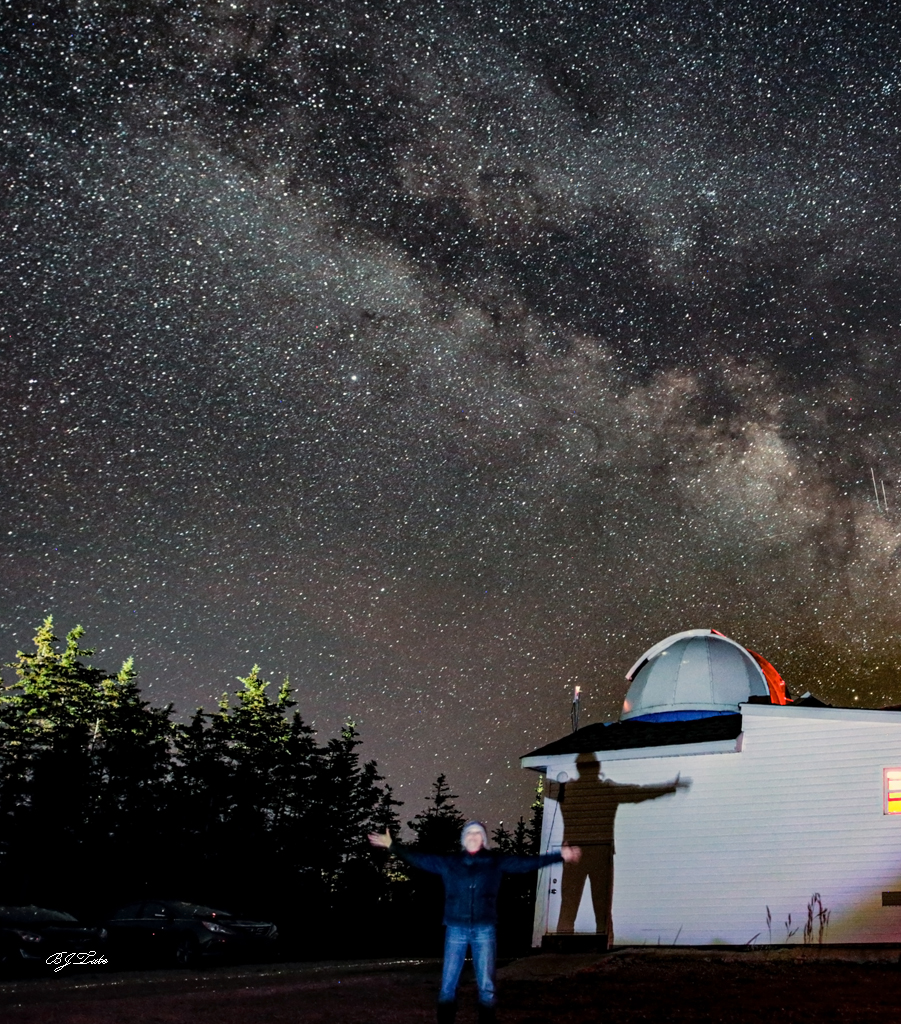Washouts, Wattage and Wonders
Celebrate the Sky!
(I get carried away sometimes.)
So it's pouring again. We've seen so many rainfall alerts this year, the new norm for weather forecasts is a red banner. The skies are cloudy all day and all night too, much of the time. This isn't "Home on the Range". And if the usual summer trend recurs this year, we'll face drought later on. Instead of an inundation, we'll enjoy dessicated lawns and unwashable-at-home laundry. Maybe the pattern will break. Maybe the sun will shine all day and the rain will fall only after sundown and … oh, wait. This is an astronomy blog! No post-sundown cloud, for goodness' sake.
The thing is: astronomers such as Tim - and astrophotographers like me - endure more than our share of weather-related disappointments. We desperately need clear skies. In summer, the long twilight hours mean that darkness is shortened considerably to begin with. Observatory sessions start later than in spring or fall months. And then there's the moon, which stymies even the most brilliant stars when it's close to full and rises at the wrong hour. Celestial bodies at immense distances can't compete with intense light closer to or on the earth.
Light itself – from the wrong sources – is a pollutant when it radiates upward and obscures the night. It's hard to see past this blazing horror. Nocturnal creatures – various species of mammals, birds, insects, amphibians – can't successfully feed, mate or migrate. Excessive illumination confuses them and interrupts their life cycles. Sometimes it destroys them entirely and they vanish. (*) The rural darkness used to be spangled with fireflies. I remember seeing them all around me when I was a child, out in the country at night. Now, I seldom get to enjoy their company. When a firefly does appear, I get excited enough to aim my camera and try for some photos. It's almost as if a star were brought to me. And then I feel sad at how few are still around, except in specific areas. Saturniidae – including moths such as the Luna, which are active at night – seem to be declining too. We turn on outdoor lights and leave them burning. The moths circle and circle. They don't always breed successfully. Our LED lighting is helping to kill them off as surely as any poison. They mistake it for daytime. Some lay eggs near light sources because they’re already pregnant when we see them on the exterior walls or doors of our homes. This can affect reproduction outcomes. (**)
My porch fixture is yellow, not so appealing to bugs. Less disorienting. To help me safely navigate my property, I have a few solar path lights that radiate downward and are on the warm end of the spectrum as well. But everywhere I go on my photo rambles, I see endless strings of street and house and business lighting. Blue-white, much of it – hard on night vision. You can find yourself out on the most remote road in the back woods and someone will put up a brilliant light there. It's discouraging. We're losing access to darkness. We can't even establish proper sleep cycles in much of the world. The glare fools our bodies into believing they ought to be up and energized.
Millions of people in North America alone have never seen the Milky Way. 80% of Americans, according to a National Geographic article from 2016, are unable to detect it. (***) We get many of them here. They're astounded when they step outside after Tim's introductory talk and the glimmering arch spans the night. They stand and stare, speechless. Last summer, one visitor who was viewing the Milky Way for the first time ended up staying outside instead of going into the dome to use the big scope with the others. He just wanted to gaze at the galaxy. He couldn't believe it. Apparently his neigbour's exterior lighting shone on his home and deck every single night. So his eyes were never adjusted to detect the stars.
He lived in Pubnico. Not New Orleans or Toronto or Paris. Pubnico!
Houston, we have a problem.
Then there's the saga of the Maine-NS ferry that docks in Yarmouth and brings us so many visitors. As a dark sky preserve, certified by the International Starlight Foundation, we've become a prime destination for ecotourists looking to the heavens. From here to Keji and in other parts of NS as well, they come to look and marvel at what we have to offer. We value their presence; we desperately need them! We're not exactly the richest place on the planet, except in natural beauty and in our people. Ecotourism is where the future lies. We can’t risk losing these welcome guests to our shores. And even if it weren't a matter of income, we'd still want them here, because we promote these skies and these experiences every chance we get.
Some of the most enthusastic guests at Deep Sky Eye are from all over the US, especially the larger cities. Others arrive from overseas. Many also make the trip from elsewhere in Canada. The rest are from the local area. I love meeting them and helping to show them the glories so remote, yet so accessible to us. Behold, I bring you basketfuls of stars.
Raynardton in May - close to my home and a 15-minute drive from Deep Sky Eye
So yes, there may well be discouragements. There are flaws in the fabric. We kind of expect that; nothing comes without its warts and bruises. Still, without shadows there can be no dimensionality. They give contour to experience. They're as important as brightness. And brightness we do have!
The National Geographic Night Sky Odyssey is one of those heartlifting perks newly laid before us. Details can be found elsewhere on this site. When a global entity with the kind of reputation owned by NatGeo wants to partner with a small observatory on a back-country byway of a little province, then you know we've got something seriously worthwhile here. This innovative program is in its beginning stages now. We've started to use it and our guests seem to be finding it both unique and rewarding. It's something they don't have to leave at the dome when they finish their evening here. They can continue to explore its features at home and learn more than they can possibly get in three hours. And it's fun, too!
Another balance to disappointment? The sky itself! When the nights are clear, the universe glitters and dances in the kind of show you'll never see on Broadway. THESE are the truest of all stars. Their command performance may be subject to change without notice if mist rises from the river or layers of cloudy-wool press down, but forecast apps can usually predict conditions with considerable accuracy. And when an app gets it wrong this, too, is often quite entertaining. A supposedly perfect viewing experience ends up as a thunderstorm. The glimmer comes from bolts flung from an electric hand. And then … the fury passes; the stars reappear. It's a kind of magic and it makes the breath catch.
In the process of observation, hushed conversations rise and fall in many languages. The green laser pointer traces a teapot, a dolphin, a swan, a bear. Myths are shared. Questions are raised and usually (but not always!) answered. Children seem particularly adept at asking the thorniest ones. Queen Cassiopeia in her golden chair listens impassively. The people come and go; she remains calm, in all her splendour. Meteors zip and fade. Sometimes, so many appear that we stop whatever else we're doing and simply wait for the next one. Tim has spotted countless meteors over the years and I've seen a fair number too. Even taken some photos of their trails. But every one brings a tiny leap of joy to the soul. Every time. Always fresh and wonderful.
Rains and boats, light and cold … yet here we are. The skies aren't subject to human emotions. They feel neither sorrow nor regret. They just exist and follow their appointed place in the cosmos, moved by the forces that propel them and their light on and on and on.
In such an immensity, can passing setbacks matter so much? I suspect not. The universe will continue regardless, so we might as well look up and celebrate too. We could do worse, right?
~ Brenda
(*) Florida Atlantic University Astronomical Observatory (many excellent posts and articles here)
http://cescos.fau.edu/observatory/lightpol-environ.html
(**) The Vanishing Night: Light Pollution Threatens Ecosystems – Diana Kwon
https://www.the-scientist.com/features/the-vanishing-night--light-pollution-threatens-ecosystems-64803
(***) 80 Percent of Americans Can’t See the Milky Way Anymore – Michelle Z. Donahue
https://news.nationalgeographic.com/2016/06/milky-way-space-science/
Just outside the observatory looking southeast above the driveway - June 2019
Let There Be (Too Much) Light …
The impact of excessive surface glare, even when it comes from outside the perimeter of a property, is apparent. This came from a single fixture on a tall pole. It makes for artistic effects though. I’ve edited this one to enhance my shadow and define the edges of the leaves. I didn’t need to boost the lighting. (This situation has since been addressed, much to everyone’s relief, and is no longer a problem to the observatory or its grounds).
Astronomical twilight has just ended and true darkness is now beginning at around 11:24 PM, one day after summer solstice. Light pollution in the background emanates from a community to the west of here. It might well be from Yarmouth. Light has a very long reach. The photo was taken beside the Quinan River, down at the firepit area. Heavy rains have flooded this spot so the firepit is underwater and the furniture has been relocated to drier ground. This, too, shall pass.





